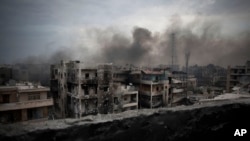In the immediate wake of the Iran nuclear deal there was a flurry of diplomacy involving Washington, Moscow and Tehran with talk that the time might be right to hammer out an agreement to end Syria’s four-year-long civil war. But with renewed commitments from Iran and Russia to shore up President Bashar al-Assad there seems no end in sight for the ruinous war of attrition that has left an estimated 240,000 people dead.
No one is budging their hard-held positions inside or outside Syria, despite the recognition by most parties involved that defeating the extremists of the Islamic State should be among the highest priorities — and that is unlikely to happen while the civil war rages.
Last month, the U.N. Security Council backed a new push for peace in Syria in a measure adopted by Damascus' ally Russia and the other 14 member states, marking the first time in two years that the council had agreed on a political statement on Syria. The 16-point plan drafted by France included a call for the “establishment of an inclusive transitional governing body with full executive powers, which shall be formed on the basis of mutual consent while ensuring continuity of governmental institutions.”
For the West the mounting refugee crisis roiling Europe has added urgency to the search for some kind of resolution to the barbaric conflict.
Over the weekend Germany’s Foreign Minister Frank-Walter Steinmeier pushed “for a new diplomatic initiative” in talks with his Russian counterpart, according to his spokesman Martin Schäfer.
Schäfer says the Syrian conflict is of mounting concern “due to the increasing amount of human suffering and need of refugees from the region who are trying to seek asylum here [in Germany] or elsewhere.”
Speaking to the BBC Monday, Gen. John Allen, President Obama’s envoy for the U.S.-led coalition combating IS, said the key to solving the refugee crisis is ending the war in Syria. “This instability has been created by Bashar al-Assad and that regime. He ultimately chose to make war on his own people. That ultimately created the crisis that we face today,” he said. Allen said not only has IS to be defeated but President Assad “had to go.”
But Allen appeared to hint the broader civil war in Syria will be ended not by military means and the clash of arms. “The conflict has got to be solved at a political level and a global level,” he said.
That some kind of political deal signed on to by the Assad government, the variegated opposition battling him with a dizzying array of rebel factions and their foreign backers will be a tall order. Last week, a key foreign supporter of the Syrian government, Iran, which has shored up President Assad with billions of dollars worth of arms, fuel and loans as well as thousands of proxy fighters, indicated it is not ready to agree that Assad should go, the bedrock demand for all rebel groups.
“Those who set conditions about the Syrian president should be blamed for the continued war,” Iran’s foreign minister, Javad Zarif, said on September 7. A day later Iranian President Hassan Rouhani told a news conference in Tehran that he is willing to sit down with Iran’s international rivals, including adversary Saudi Arabia, to discuss the crisis in Syria. But he emphasized there could be no debate about the future of President Assad until peace is achieved. Yet as far as the insurgents are concerned, peace can’t be achieved without Assad going.
Russia’s commitment to Assad is also steadfast. Sergei Lavrov, the Russian foreign minister, has dubbed the demand for Assad to go “unrealistic and counterproductive.”
And with Russia in the past few weeks abruptly upping its support for the Syrian government, adding to a constant flow of weapons, intelligence and technical aid by air and sea, the prospects for some kind of diplomatic breakthrough have dimmed. The rate of ships docking at Russia’s naval depot in the Syrian port of Tartus has grown in what U.S. officials complain amounts to a military buildup. On Sunday, Foreign Minister Lavrov said the military supplies are “ongoing and they will continue,” according to Russian news agencies.
But he dismissed U.S. accusations that Russia has started to rotate in and out highly trained infantry, saying the supplies are “inevitably accompanied by Russian specialists, who help to adjust the equipment, to train Syrian personnel how to use these weaponry.” Lavrov said the military aid is to help combat the jihadists of IS rather than the rebels — a claim dismissed by Western officials, who say the aid helps Assad survive.
Meanwhile, the U.N.’s special envoy for Syria, Staffan de Mistura, has been shuttling across the Middle East and Europe to try to create the circumstances for a negotiated political settlement. His earlier initiative pushing for local cease-fires to help build up trust is now dead, U.S. officials told VOA.
And as the search for peace drifts, the refugee influx is likely to grow as ordinary Syrians despair of any conclusion to the conflict, warn Syrian rebel leaders. “Those fleeing the world’s worst humanitarian crisis see no prospect of improvement,” says Bassam Abdullah, representative to Germany of the Syrian Coalition, a Western-backed opposition group.
“Syrians are by far the largest group embarking on the perilous journey to seek asylum in Europe. There is good reason for this. For the past four years Syrians have endured a crippling conflict that has seen the use of chemical weapons against civilians, a growing extremist threat, and daily bombardment of innocent people,” he added.




